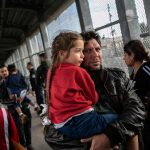A husband and father of two young children found dead and dismembered in a suitcase on a street in eastern Tijuana, Mexico. A single mother too terrified to leave her two-room shack in Tijuana after being abducted with her nine-year-old daughter for a $10,000 ransom. A man tortured in front of his three-year-old son after the two were kidnapped while walking down the streets of Reynosa, leaving his wife to desperately scrape together funds for their release.
These are accounts from just one recent week of the horrors endured by men, women, and children who had formally applied for asylum in the United States after fleeing beatings, killings, forcible gang recruitment, threats and extortion, and widespread sexual and domestic violence in their Central American countries. Each has now faced the very kind of violence and trauma they sought to escape as a direct result of the Trump administration’s Migrant Protection Protocols (MPP), known as the “Remain in Mexico” policy. And these accounts are just the tip of the iceberg. There are public reports of more than 600 asylum seekers returned to Mexico under MPP over the past 10 months that have been victims of “rape, kidnapping, torture, and other violent attacks.”
As emergency physicians who have provided medical care and performed forensic evaluations of asylum seekers in Tijuana over the past several years, we have witnessed how MPP directly exposes migrant men, women, and children who come to America in bona fide need of protection to ongoing, pervasive violence. The MPP policy was first implemented in February 2019 in Tijuana and forces asylum seekers to remain in under-resourced border towns in Mexico as they await court proceedings in the United States. The administration touts MPP as a mechanism to reduce “overcrowding” in detention facilities and an alternative to family separation. But instead of finding the safety they so desperately seek while their asylum claims are reviewed, migrants are being routinely exposed to extreme violence and trauma.
By endangering lawful asylum seekers, the Remain in Mexico policy violates the United States’ longstanding commitments under both domestic and international law. The established legal principle of non-refoulement bars countries from returning asylum seekers to a place where they could be subjected to great risk, irreparable harm, or persecution. The U.S. administration’s rejection of this principle and willingness to impose such risks seems rooted in the unfounded view that asylum seekers are really economic immigrants who concoct phony persecution claims to game the system in order to gain entry to the United States.
This is far from the truth that we saw earlier this year when we traveled to Tijuana with a team of Physicians for Human Rights clinicians. Our interviews and medical evaluations of 18 asylum seekers provided credible accounts and corroborating evidence that these people had indeed fled persecution and bear physical marks of the trauma they have suffered.
The recent murder and dismemberment of the asylum seeker in Tijuana is just one extreme example of how the “Remain in Mexico” policy compounds the trauma these migrants seek to escape and renders them highly vulnerable to grave new dangers. Our first sworn obligation as physicians is to do no harm; an asylum system specifically designed to protect those fleeing harm must, at a minimum, not impose further injury.
The U.S. Congress must muster the political will to direct the Department of Homeland Security to abolish and defund the MPP and other policies that unlawfully violate the rights of asylum seekers and stain our collective conscience. Until it does, the lives of tens of thousands of asylum seekers stranded in Tijuana and other cities along the border not only “Remain in Mexico” – they remain in serious, unnecessary, and life-threatening danger.
Madeline Ross, MD is a Physicians for Human Rights forensic medical evaluator and emergency medicine resident at LAC+USC Medical Center.
Todd Schneberk, MD, MS, MA is a Physicians for Human Rights medical expert, co-director of the USC Keck Human Rights Collaborative, and assistant program director of the LAC+USC Emergency Medicine Residency Program.

